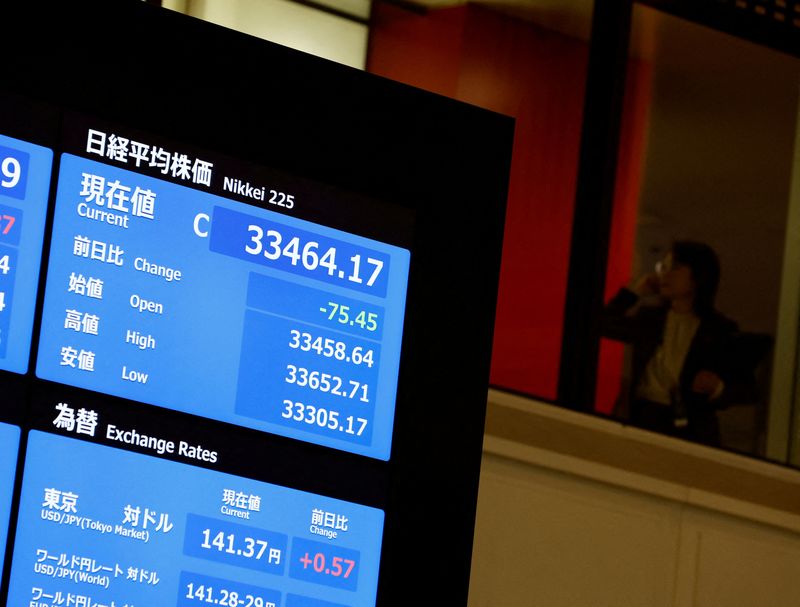By Stephen Culp
NEW YORK (Reuters) - U.S. stocks retreated on Tuesday while the dollar gathered strength amid warnings that markets might have gotten ahead of themselves with respect to the timing and extent of central bank policy cuts.
A broad sell-off pulled all three major U.S. stock indexes lower while the greenback advanced and the benchmark U.S. Treasury yield climbed to its highest level since mid-December.
"There seems to be vacillation in terms of whether or not the Fed are going to cut rates in March, and today seems to be one of those days where investors have decided that maybe they're not going to cut rates in March," said Chuck Carlson, chief executive officer at Horizon Investment Services in Hammond, Indiana.
"Couple that with higher interest rates and you get a sell-off like this, which seems to be a 'sell everything' day," Carlson added.
U.S. Federal Reserve Governor Christopher Waller echoed the sentiments of his European counterparts on Tuesday, saying that while U.S. inflation is approaching the central bank's 2% goal, the Fed should not rush to lower interest rates until lower inflation can clearly be sustained.
At last glance, financial markets were pricing in a 65.2% likelihood of a 25-basis-point interest rate cut at the conclusion of the Fed's March meeting, according to CME's FedWatch tool.
The fourth-quarter earnings season has just burst through the starting gate, with 29 companies in the S&P 500 having reported as of Friday.
Analysts currently see aggregate annual S&P earnings growth of 4.4% in the October-December period, down from 11% at the start of that period.
Investors were also parsing a raft of other political and geopolitical developments, including Donald Trump securing a resounding win in the first 2024 U.S. Republican presidential contest in Iowa on Monday, and developments in the Red Sea, Gaza and Ukraine.
The Dow Jones Industrial Average fell 231.86 points, or 0.62%, to 37,361.12, the S&P 500 lost 17.85 points, or 0.37%, to 4,765.98 and the Nasdaq Composite dropped 28.41 points, or 0.19%, to 14,944.35.
European shares also pulled back due to waning optimism over rate-cut expectations following comments by European Central Bank officials. Investors are also closely watching the World Economic Forum in Davos, which entered its second day.
The pan-European STOXX 600 index lost 0.24% and MSCI's gauge of stocks across the globe shed 0.75%.
Emerging market stocks lost 1.66%. MSCI's broadest index of Asia-Pacific shares outside Japan closed 1.78% lower, while Japan's Nikkei lost 0.79%.
The dollar touched a one-month high against a basket of world currencies as investors reined in rate-cut bets and eyed simmering tensions in the Middle East.
"The Fed commentary favors the dollar, and geopolitical concerns continue to grow, so the dollar becomes a safety play," said Peter Cardillo, chief market economist at Spartan Capital Securities in New York.
The dollar index rose 0.95%, with the euro down 0.69% to $1.0872.
The Japanese yen weakened 1.02% versus the greenback at 147.27 per dollar, while Sterling was last trading at $1.2632, down 0.73% on the day.
U.S. Treasury yields headed higher as the previous week's bullish sentiment dampened and central bankers pushed back against expectations of easier monetary policy.
Benchmark 10-year notes last fell 31/32 in price to yield 4.0676%, from 3.95% late on Friday.
The 30-year bond last fell 63/32 in price to yield 4.3072%, from 4.198% late on Friday.
U.S. crude prices fell as the cooling rate expectations pushed the dollar higher and weather forecasters predicted a warmer-than-normal January.
U.S. crude fell 0.39% to settle at $72.40 per barrel, while Brent settled at $78.29, up 0.18% on day.
Gold prices slid in reaction to Waller's hawkish remarks and in opposition to the strengthening dollar.
Spot gold dropped 1.3% to $2,027.89 an ounce.
